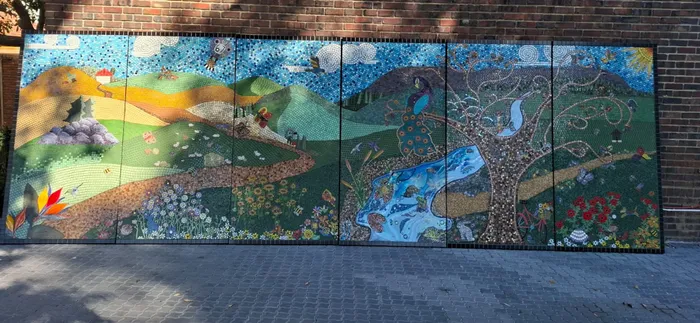Lucy G hopes to revive craft cafe with mural sale

Lucy G Foundation, a non-profit organisation, hopes to sell this mosaic mural to revive its craft cafe. Picture: Supplied
A non-profit organisation that provides training and work opportunities for the disabled, wants to sell a mosaic mural to revive its craft cafe, which was closed by the economic impact of the Covid pandemic.
The mural, inspired by the province’s natural heritage, has six panels, each is 2.5m tall and 1.25m wide. They depict rolling green hills, a mountain with a river flowing beneath it. The green fields are peppered with flowers, birds, bees, rabbits and tortoises.
Retired occupational therapist Diana Phillips, of Meadowridge, and her friend, Helen Garaghty, of Bergvliet, came up with the idea for the Lucy G Foundation in 2017. It’s named after Ms Garaghty’s late daughter, Lucy, who had promised to care for her mentally challenged older sister, Johanna, when her parents died.
The mural, created by over 20 of the foundation’s young disabled adults and volunteers, embodied the foundation's belief that everybody could make something beautiful, and if you could dream it, you could make it happen, said Ms Phillips.
She said she had found that many parents of disabled children feared they would fail to find work and and live independently as there were few opportunities for them outside of protective workshops.
The Lucy G Craft Cafe, which opened in Kirstenhof in 2018, had been conceived as a way to train young, disabled adults for the hospitality industry and create more meaningful work opportunities for them, she said.
Activities at the cafe included fabric painting, mosaic work, woodcraft and the serving of light meals to the public.
The cafe drew scrapbooking clubs, knitting groups, book clubs, counselling groups and birthday parties, and it not only improved the employability of those who worked there, it also honed their life skills, said Ms Phillips.
“It kind of evolves from developing a work skill to knowing that their income is related to their productivity, so then they start becoming more aware of and developing life skills,” she said.
According to Ms Garaghty, people who wandered in for coffee, would leave with an earnest interest in the concept of an inclusive working space.
“The beauty of it is that the craft cafe cultivated an environment where people with special needs were accepted. People who came in for coffee would sit and observe all sorts of arts and crafts going on and our young people with special needs taking orders for the kitchen or manning the tills. Then they would eventually ask, ‘What goes on here?’”
Volunteers would support the young adults taking meal orders as well as those working in the kitchen, and written cues with pictures were used to explain what and how much to make, she said.
And, Ms Phillips added, soon the pictures were no longer needed.
“The first time they used a knife was with us. Some of them had never used a vacuum before or learned how to wash dishes properly, not just to run under the tap. A lot of them learned how to make sandwiches, salads, smoothies and milkshakes. When we were donated a little oven, the young adults were making biscuits and cookies, quiches as well. It was just amazing to watch them just blossom and go home and just say, ‘I can do this and let me show you.’,” said Ms Phillips.
“It was an amazing project while we had it, and then with Covid, it just kind of slowly sank away, and we kept thinking Covid would be six months. Two years later then we just couldn't hang in there anymore,” Ms Phillips said.
Selling the mural was the first step towards starting the dream of Lucy G again, she said.
“It's now sitting in storage, and it seems such a waste to let it. If we can't get Lucy G going, we'll donate it to another NGO that empowers, but I would really love to see it working because it made such a difference.”

Related Topics: